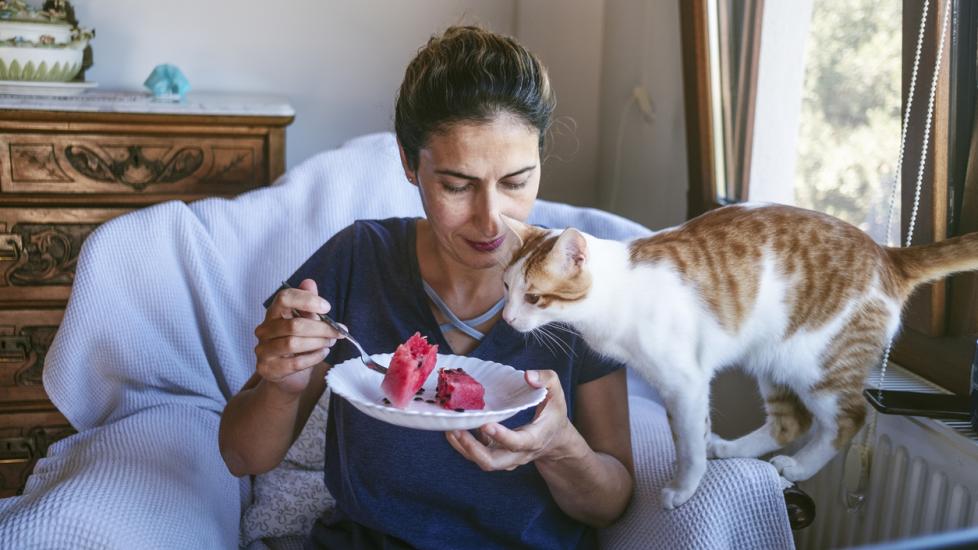Can Cats Eat Watermelon?
NOTE: Always check with your veterinarian first before giving your cat any new foods, especially “people foods.” What might be okay for one cat might not be good for your cat, depending on multiple factors, such as their age, health history, health conditions, and diet. Cats on prescription diets should not be fed any food or treats outside the diet.
Watermelon is a refreshing snack, a great addition to smoothies, and quite healthy for humans. But is the same true for your feline friend? The short answer is that yes, cats can safely eat watermelon, but the health benefits aren’t the same as for people.
Is Watermelon Good for Cats?
While watermelon is relatively safe for healthy cats and kittens, it really isn’t considered to be good for them.
The intestinal tract of felines was designed to process meat products only—they are known as “obligate carnivores.” This means that they aren’t able to extract much nutritional value from fruits, vegetables, and carbohydrate-rich foods.
So, although our digestive tract—designed to eat an omnivore diet—can get all kinds of benefits from these foods, cats do not. They may benefit from some extra hydration that comes from watermelon, as well as some of the potassium or vitamin C present in the fruit, but the benefit is likely to be minimal.
In general, healthy cats and kittens should be able to eat small amounts of watermelon (a single 1-inch square cut into bite-sized pieces is more than enough for a serving). Cats that have diabetes or are obese should not be offered this as a treat, given the large amount of natural sugar in the fruit. High sugars as well as a large number of carbs could upset diabetic control and lead to worsening obesity.
Can Watermelon Be Bad for Cats?
Watermelon could be bad for cats that cannot tolerate fluctuations in sugars, like those that have diabetes or are overweight. Some cats may also have problems processing the carbohydrates and sugars in the watermelon, with even a small amount resulting in vomiting or diarrhea.
So, although we consider watermelon to be safe for healthy cats, this doesn’t mean that you should necessarily feed them watermelon. That being said, if your kitty wants to occasionally sample a small piece of your watermelon and seems to tolerate it well, it is safe to share it.
Be careful to remove any seeds, as they contain cyanide, which can be toxic in significant amounts. They can also present a choking hazard. Remove all of the rind as well, which is very difficult to digest and could also be a choking hazard. A small, bite-sized square of the flesh might just appeal to kitty as a snack.
Do Cats Like Watermelon?
Most cats never develop a fondness for watermelon, but some seem to enjoy it. Since cats lack the taste glands needed to appreciate sweets, it probably isn’t the taste that these cats are attracted to, but rather the moisture or texture.
It is unlikely that the wild ancestors of cats ever tasted watermelon, because this fruit is mostly “empty calories” for cats and it probably wasn’t around in the days of the saber-toothed tiger.
What If Your Cat Ate Some Watermelon?
If your cat is healthy and ate only a little bit of actual fruit (not the seeds or rind), you likely have little to worry about other than perhaps some concern for gastrointestinal upset. However, if your kitty has health problems (especially diabetes) or happened to munch on the rind or a lot of seeds, a call to your veterinarian might be in order.
As a rule, occasionally sharing a small amount of watermelon with your cat is safe if your cat is in good health. But don’t be surprised or disappointed if kitty says “thanks, but no thanks.” Your cat probably prefers an offering of roasted turkey instead!
Featured Image: iStock.com/U.Ozel.Images
